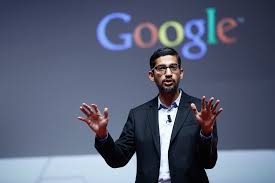Kicking off the tech giant’s annual developers conference, Google chief executive Sundar Pichai argued that its AI-powered digital assistant had the potential to free people from everyday chores.
Pichai played a recording of the Google Assistant independently calling a hair salon and a restaurant to make bookings — interacting with staff who evidently didn’t realize they were dealing with artificial intelligence software, rather than a real customer.
Tell the Google Assistant to book a table for four at 6:00 pm, it tends to the phone call in a human-sounding voice complete with “ums” and “likes,” and sends you a message with the details.
“It’s clear that technology can be a positive force and improve the quality of life for billions of people around the world.” Pichai said.
Pichai launched an overhaul Google News venue that put AI to work finding trusted sources for stories and balancing perspectives to provide fuller pictures of breaking developments.
And, evidently popping news ‘bubbles’ created by tailoring results to what people want to hear, everyone will be shown the same content on topics, according to product and engineering lead Trystan Upstill.
“Thanks to our progress in language understanding, you’ll soon be able to have a natural back-and-forth conversation with the Google Assistant without repeating ‘Hey Google’ for each follow-up request,” Pichai said.
YouTube watchers will be able to set a pop-up message to remind them to take breaks from viewing, according to Pichai.
“This is going to be a deep, ongoing effort across all our platforms,” Pichai said.
“To help you understand habits, focus on what matters, switch off and wind down.” Google is seeking to make services more personal, relevant and intimate from maps to email, Gartner analyst Brian Blau told AFP after the keynote presentation.
“The are taking a very human approach to technology, and convincing you people can continue to rely on Google,” Blau said.
